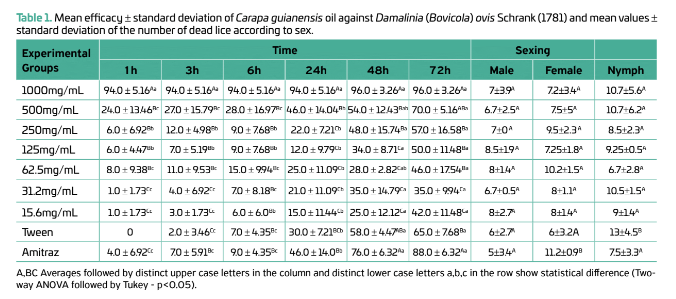In vitro efficacy of Carapa guianensis Aublet (Meliaceae) oil on Damalinia (Bovicola) ovis Schrank (1781)
DOI:
https://doi.org/10.21708/avb.2021.15.4.10142Resumo
Productivity in small ruminants can be compromised due to lice infestations. This pest infestation is controlled by the administration of insecticides, and their excessive use causes resistance. New control alternatives are being investigated, especially the use of phytotherapeutics. Research using the oil from Carapa guianensis (andiroba) has shown insecticidal action on feline and goat lice specimens. The present study aimed to evaluate the efficacy of C. guianensis seed oil, in vitro, on Damalinia (Bovicola) ovis. Nine hundred specimens of D. (Bovicola) ovis were randomly assigned into groups and were subjected to different treatments: (G1) 1,000 to 15.6 mg/mL of C. guianensis oil; (G2) 3% Tween 80 (negative control); and (G3) amitraz 1.25 g/mL (positive control). Data presentation was expressed as mean efficacy ± standard deviation using the statistical program SPSS version 23.0 and statistical differences of the experimental groups were obtained by Kruskal-Wallis and Friedman. Probit Regression was performed to obtain CI50 and CI90, with a significance level of p < 0.05. The oil with a concentration of 1,000 mg/mL had an efficacy of 94% after 24 hours of exposure, differing statistically from the positive and negative control (p < 0.05). The IC50 and IC90 values were 439.21 mg/mL and 807.09 mg/mL, respectively. The action of the oil on the specimens was independent whether it was an adult female, male, or nymph. It is concluded that C. guianensis oil showed in vitro insecticidal effect against D. (Bovicola) ovis.
Downloads

Downloads
Publicado
Edição
Seção
Licença
Autores que publicam na Acta Veterinaria Brasilica concordam com os seguintes termos: a) Autores mantém os direitos autorais e concedem à revista o direito de primeira publicação, com o trabalho simultaneamente licenciado sob a Licença Creative Commons Attribution que permite o compartilhamento do trabalho com reconhecimento da autoria e publicação inicial nesta revista. b) Autores têm autorização para assumir contratos adicionais separadamente, para distribuição não-exclusiva da versão do trabalho publicada nesta revista (ex.: publicar em repositório institucional ou como capítulo de livro), com reconhecimento de autoria e publicação inicial nesta revista. c) Autores têm permissão e são estimulados a publicar e distribuir seu trabalho online (ex.: em repositórios institucionais ou na sua página pessoal) a qualquer ponto antes ou durante o processo editorial, já que isso pode gerar alterações produtivas, bem como aumentar o impacto e a citação do trabalho publicado (Veja O Efeito do Acesso Livre).


 Esta obra está licenciada com uma Licença
Esta obra está licenciada com uma Licença 